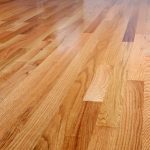Hardwood floors are highly durable if they’re properly taken care of. Routine cleaning methods such as dusting and mopping will help your hardwood floors go a long way. Hardwood Floor finishes provide that extra toughness your hardwood floors crave. Think of it as a car wash, when the car is finished, it looks nice and glossy. Hardwood flooring finish acts the same way, except they last far longer than any car wash. They help your floors stay structurally solid as well as provide your floors with a unique lasting look, helping them stay natural and fresh. There are two main types of sealants for residential hardwood floors: surface and penetrating.
Surface Sealants
Surface sealants are exactly the way they sound: sealants that lie above the surface. They aim at coating the top of your hardwood floors by creating a thin, strong layer of protection. There are a few types of surface sealants you should be aware of.
Shellac – this sealant is one of the oldest in the books, but still has some shine to it. It provides your hardwood floors with a natural glossy overtone. It’s not as durable as some of the other sealants, but it still gets the job done when you’re looking for a cheap, sustainable sealant.
Varnish – another oldie, but goodie. It typically isn’t used much today as better options exist, but it still is versatile when it comes to different tints. It’s relatively inexpensive (similar to Shellac) but requires a deft hand to apply as it dries slow, allowing dust to complicate the process.
Lacquer – this is a finish that can be applied by spraying it on. Water-based lacquers cost more than varnish or shellac, but offer a quality glossy finish that is very durable.
Urethane – these are the new standard of finishes. They boast the highest possible gloss and excellent durability. Oil-based, water-based, and acid-based urethanes exist. Oil-based are normally inexpensive and easy to apply, but are potentially hazardous to your health and take awhile to dry. They also have a tendency to turn yellow over time. Water-based are more environmentally friendly and do not yellow over time, but lack the strength of an oil-based urethane sealant. Acid-based urethanes dry extremely fast and do not yellow over time, but are flammable and typically require a professional to apply correctly.
Penetrating Sealants
Penetrating sealants do exactly what their name says: penetrate your hardwood floors. These sealants soak into the wood by filling the pores, helping to protect it. Penetrating sealants help bring out the best in your wood. However, they typically aren’t favored because they do not give off the fancy gloss that surface sealants can produce. They must also be applied consistently. There are three types of oils to familiarize yourself with.
Tung Oil – a classic that has been used for many years is tung oil, which is an oil that comes from tung tree nuts. It’s a very natural “green” product that is easy to apply. It’s not the most durable choice, as it requires many applications to receive the durability you want, but it’s one of the least harmful choices out there.
Linseed Oil – an oil made from flax plants, this oil is also a natural choice very similar to tung oil. This oil isn’t as water-resistant as tung oil, but you can fix most scratches that may happen on your hardwood floors easier with this sealant. It’s more forgiving.
Danish Oil – this oil is normally a mixture of tung oil and varnish. It can also be classified as a surface sealant, but it penetrates as well. It dries quickly, is more durable than the other oils, and requires fewer coats. Of course this all comes at the cost of a higher price than the other options.
Sealants are a great investment to maintaining your hardwood floors and there are two things to keep in mind when you select one: dry time and the color it will produce.
We hope this information can help you seal the deal. For more info, view our post on Refinishing Your Hardwood Floors


Leave A Reply